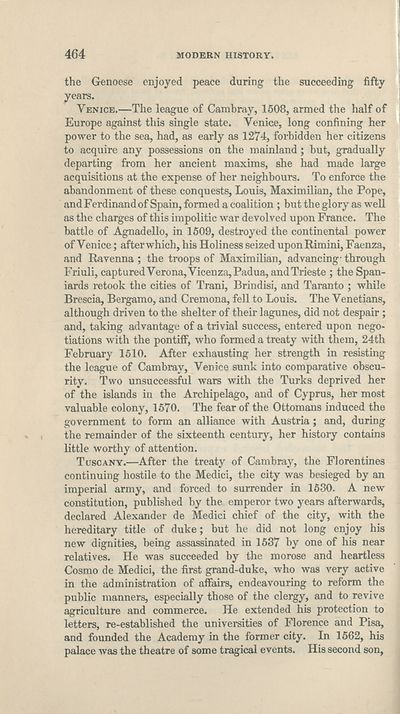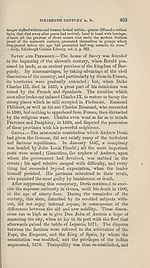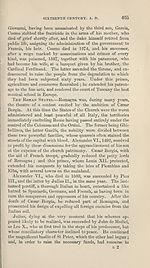Download files
Complete book:
Individual page:
Thumbnail gallery: Grid view | List view

464
MODERN HISTORY.
the Genoese enjoyed peace during the succeeding fifty
years.
Venice.—The league of Cambray, 1508, armed the half of
Europe against this single state. Venice, long confining her
power to the sea, had, as early as 1274, forbidden her citizens
to acquire any possessions on the mainland; but, gradually
departing from her ancient maxims, she had made large
acquisitions at the expense of her neighbours. To enforce the
abandonment of these conquests, Louis, Maximilian, the Pope,
and Ferdinand of Spain, formed a coalition ; but the glory as well
as the charges of this impolitic war devolved upon France. The
battle of Agnadello, in 1609, destroyed the continental power
of Venice; afterwhich, his Holiness seized uponRimini, Faenza,
and Ravenna ; the troops of Maximilian, advancing- through
Friuli, captured Verona, Vicenza, Padua, and Trieste ; the Span¬
iards retook the cities of Trani, Brindisi, and Taranto ; while
Brescia, Bergamo, and Cremona, fell to Louis. The Venetians,
although driven to the shelter of their lagunes, did not despair ;
and, taking advantage of a trivial success, entered upon nego¬
tiations with the pontiff, who formed a treaty with them, 24th
February 1510. After exhausting her strength in resisting
the league of Cambray, Venice sunk into comparative obscu¬
rity. Two unsuccessful wars with the Turks deprived her
of the islands in the Archipelago, and of Cyprus, her most
valuable colony, 1570. The fear of the Ottomans induced the
government to form an alliance with Austria ; and, during
the remainder of the sixteenth century, her history contains
little worthy of attention.
Tuscany.—After the treaty of Cambray, the Florentines
continuing hostile to the Medici, the city was besieged by an
imperial army, and forced to surrender in 1530. A new
constitution, published by the emperor two years afterwards,
declared Alexander de Medici chief of the city, with the
hereditary title of duke; but he did not long enjoy his
new dignities, being assassinated in 1537 by one of his near
relatives. He was succeeded by the morose and heartless
Cosmo de Medici, the first grand-duke, who was very active
in the administration of affairs, endeavouring to reform the
public manners, especially those of the clergy, and to revive
agriculture and commerce. He extended his protection to
letters, re-established the universities of Florence and Pisa,
and founded the Academy in the former city. In 1562, his
palace was the theatre of some tragical events. His second son.
MODERN HISTORY.
the Genoese enjoyed peace during the succeeding fifty
years.
Venice.—The league of Cambray, 1508, armed the half of
Europe against this single state. Venice, long confining her
power to the sea, had, as early as 1274, forbidden her citizens
to acquire any possessions on the mainland; but, gradually
departing from her ancient maxims, she had made large
acquisitions at the expense of her neighbours. To enforce the
abandonment of these conquests, Louis, Maximilian, the Pope,
and Ferdinand of Spain, formed a coalition ; but the glory as well
as the charges of this impolitic war devolved upon France. The
battle of Agnadello, in 1609, destroyed the continental power
of Venice; afterwhich, his Holiness seized uponRimini, Faenza,
and Ravenna ; the troops of Maximilian, advancing- through
Friuli, captured Verona, Vicenza, Padua, and Trieste ; the Span¬
iards retook the cities of Trani, Brindisi, and Taranto ; while
Brescia, Bergamo, and Cremona, fell to Louis. The Venetians,
although driven to the shelter of their lagunes, did not despair ;
and, taking advantage of a trivial success, entered upon nego¬
tiations with the pontiff, who formed a treaty with them, 24th
February 1510. After exhausting her strength in resisting
the league of Cambray, Venice sunk into comparative obscu¬
rity. Two unsuccessful wars with the Turks deprived her
of the islands in the Archipelago, and of Cyprus, her most
valuable colony, 1570. The fear of the Ottomans induced the
government to form an alliance with Austria ; and, during
the remainder of the sixteenth century, her history contains
little worthy of attention.
Tuscany.—After the treaty of Cambray, the Florentines
continuing hostile to the Medici, the city was besieged by an
imperial army, and forced to surrender in 1530. A new
constitution, published by the emperor two years afterwards,
declared Alexander de Medici chief of the city, with the
hereditary title of duke; but he did not long enjoy his
new dignities, being assassinated in 1537 by one of his near
relatives. He was succeeded by the morose and heartless
Cosmo de Medici, the first grand-duke, who was very active
in the administration of affairs, endeavouring to reform the
public manners, especially those of the clergy, and to revive
agriculture and commerce. He extended his protection to
letters, re-established the universities of Florence and Pisa,
and founded the Academy in the former city. In 1562, his
palace was the theatre of some tragical events. His second son.
Set display mode to:
![]() Universal Viewer |
Universal Viewer | ![]() Mirador |
Large image | Transcription
Mirador |
Large image | Transcription
| Antiquarian books of Scotland > Education > Elements of universal history on a new and systematic plan > (484) |
|---|
| Permanent URL | https://digital.nls.uk/127585948 |
|---|
| Description | Thousands of printed books from the Antiquarian Books of Scotland collection which dates from 1641 to the 1980s. The collection consists of 14,800 books which were published in Scotland or have a Scottish connection, e.g. through the author, printer or owner. Subjects covered include sport, education, diseases, adventure, occupations, Jacobites, politics and religion. Among the 29 languages represented are English, Gaelic, Italian, French, Russian and Swedish. |
|---|

